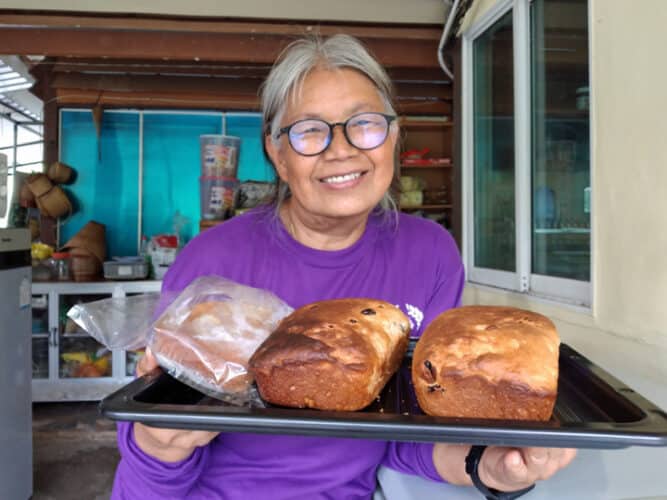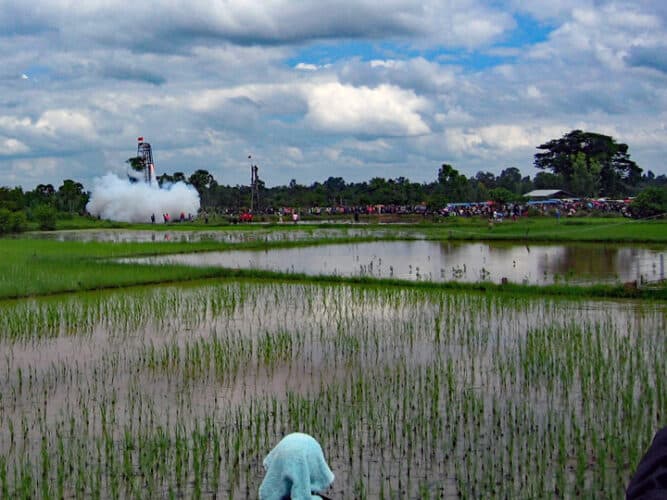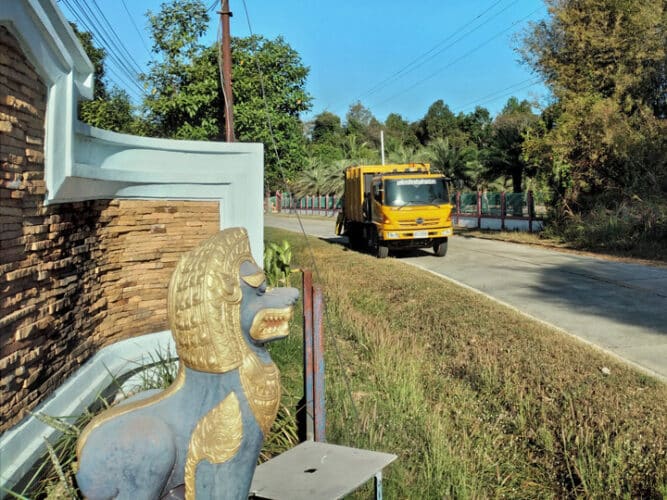Living like a Buddha in Thailand, part 4

Wife with bread from the oven
In this section information about utilities and about the food in Isaan. Of course again as I experience it.
Utilities
Because we had no electricity connection after purchasing the land, we initially had a 230V line drawn from the village for our electricity supply. But sometimes the tension fell away when, for example, there was a party in the village. Nowadays we have three-phase voltage with its own transformer. We can now also use a three-phase pump. Incidentally, the voltage still occasionally drops and sometimes for more than 24 hours. This can be caused by falling trees or swaying tree branches, for example. A few times a year, the power is also switched off during the day by PEA for maintenance on the electricity wires, for example pruning the trees. But in addition, sometimes the power goes out for just one or two seconds (sometimes a few times a day) and the voltage is not always constant.
The price of electricity is low here, currently just over 4 baht per kWh.
Tip: For a desktop, purchase a ballast that keeps the voltage constant and also contains a battery so that you have enough time to properly shut down the PC in case the voltage drops. Personally, I find a desktop more pleasant to work with than a laptop because you can place the screen and keyboard at the optimum height to prevent RSI. A laptop with a separate keyboard is of course also possible.
Our village has a water pipe, but we are too far from the village to use it. That is why we have had our own well dug and a water tower of 12 meters high. So we always have water with a pressure of more than 1 atmosphere, even if the voltage drops.
Of course we don't have a gas pipe, but with a gas tank you can cook for months for a small amount of money. We also use charcoal, not only for the barbecue but also for the kitchen. And to be economical with the charcoal, we also use an old-fashioned cover-up.
Our garbage is collected once a week, again for a small fee. That service is probably not provided throughout Thailand.
Shower water and water from the gutters is transported via a pipe to a spot on our land where it does not cause any nuisance. For the toilet we have a septic tank that is pumped empty if necessary by a specialized company.
We even have a fire department here. Roadside maintenance is often done by controlled burning. We once had a situation where control failed and the fire spread to a eucalyptus grove near us. That bush wanted to burn well with all that eucalyptus oil in the leaves. The fire service eventually extinguished it.
You normally never see the police here, not even at parties, because then a few villagers put on a uniform to make sure everything runs smoothly. But if something is really going on, the police will come.

The launch of a flare
Public transport
If I wanted to go to Ubon by bus, I would first have to walk 4 km to the nearest bus stop. That is of course possible, but with a heavy shopping bag that is not an attractive option of course. So own transport is almost a necessity, but a taxi is of course also an option, although they charge a slightly higher km rate for trips outside the city. One possibility is to order purchases via the internet and with 20 baht in delivery costs that is easy to do. My wife makes great use of it without spending a lot of money because she is frugal.
From Ubon you can make various domestic flights by plane. By train you can only travel to Bangkok, but by bus you can go to Pakse in Laos and also to Chiang Mai and Phuket. Pakse is a journey of more than 100 km, but the two other cities require journeys of more than 1000 km.
Food
The food in the Isaan is usually hot, but fortunately there are exceptions to this and in my case my wife and her employees prepare a hot meal every day and sometimes something special for me, but it is always taken into account that dishes that are too hot are not suitable for me. are spent. Those hot dishes are of course also prepared because every day there are several dishes on the table. Occasionally there were even Brussels sprouts and they are enjoyed by everyone. But Italian, Spanish and Greek dishes are also eaten. In any case, the saying that "what the farmer does not know, he does not eat" does not apply here.
Much comes from our own country and in addition to fruit and vegetables, for example, also bamboo shoots, mushrooms and corn cobs. But young leaves of a certain tree species and pods that grow on trees are also served here. Most of it is consumed uncooked.
We only eat in a restaurant a few times a month. My wife and I both have veto power over restaurant choices. Not that we have agreed on it that way, but in practice that is at least the case with the choice of restaurants. And most of the eateries in our village are subject to my veto and the only restaurant that is not subject to my veto is now subject to her veto. But don't worry, that restaurant doesn't have a liquor license anyway. And so we eat in the city a few times a month because there are excellent restaurants there or just somewhere along the highway. Unfortunately, the nearest restaurant is more than a fifteen minute drive away. If you live far from the city and you don't have a wife who can cook well and you can't cook yourself, then you have a problem in Isaan.

Papaya
Food hygiene
According to my experience, food hygiene is fine here in Thailand: zero problems in 10 years, both at home and in a restaurant. A survey (one of undoubtedly many) shows that Thailand scores relatively well among the holiday countries with 6% of respondents who indicated that they had fallen ill against, for example, Spain with no less than 30% (https://www.yahoo.com /lifestyle/the-results-are-in-the-countries-where-youre-119447773957.html). But it remains to be careful with eating outside the door and especially restaurants where there is no running water you better avoid and in any case do not eat uncooked vegetables there.
Disease
Flu and colds don't seem to occur here and COVID didn't really get a foothold here either. Actually that can be explained well:
The natural resistance of the inhabitants of the countryside in particular is usually good because, due to the absence of McDonald's and 7-Eleven, the people here often eat a varied diet, so that they get enough vitamin C, quercetin and zinc, are slim and the sun also gives them a healthy tan. have built up an adequate supply of vitamin D. In addition, there is little air pollution here and most houses are extremely well ventilated, plus people live outdoors. They also often come into contact with coronaviruses because they often keep (poultry) livestock, which means they already have some natural resistance to COVID. The farang benefits from this because the risk of contamination is relatively small. In my circle of Thai acquaintances, there was "only" one COVID death to regret and that was not due to the virus but due to the vaccine. The surviving relatives of the previously healthy 40-year-old woman have received THB 200.000 from the government.
Tip: Farangs living in Ubon are fortunately already at little risk of dying from COVID, but they can reduce that risk even further by increasing their resistance. There are many tips for this at https://artsen Collectief.nl/hoe-zorg-ik-voor-een-optimale-afweer/. The most important tip, however, is: lose weight! The chance of hospitalization with COVID increases exponentially with every kilo, starting at a BMI of 23. No vaccine can compete with that. Of course it is also important to prevent you from coming into contact with the virus for a long time and/or for a long time.
Groceries
The range of shops and markets in the countryside is of course limited. Some products are very cheap, but others are expensive because they are purchased from MAKRO, for example. But because most rural people only come to the city in exceptional cases, they have to rely on those shops and markets. For example, my wife's employees sometimes ask us if we want to buy something for them when we go shopping in the city. There is plenty to buy in the city, although the offer is of course not as lavish as in Bangkok.
Noise disturbance
We live on a quiet road and our house is 80 meters from the road. So there is hardly any noise pollution and after sunset it is often dead quiet. However, frogs and toads can sometimes burst into a noisy concert and cicadas can also make quite a bit of noise.
Associations
I don't think association life as we know it in the Netherlands exists here. For example, football is played here in a competitive context, but teams participate in it, not associations. I have also seen volleyball and hockey here, but that was based on schools. Tennis and badminton are also played, but not in a club context. There are no chess clubs, but I once met a Thai who played chess and not that bad. Card games are forbidden, so bridge won't work here either. Rowing competitions are held here, on lakes and rivers. Every year in our village competitions are held with giant flares and each “moo” has its own team. What are of course held here are village festivals and parades.

Garbage collection service
nightlife
I myself only throw myself into the nightlife during holidays, but even that means no more than a beer in a bar. Due to lack of experience, I am therefore not sure about my case with my following description of the nightlife here:
Karaoke is still popular here and even in the countryside you can sometimes go for it. But you will not find a bar like you have in the Netherlands, Belgium or Pattaya here. For example, after a football match we sometimes drank a beer, sometimes even with a barbecue, on the edge of the field. But a few times we went somewhere else to drink. Not in a bar, but always in a restaurant. Drinking without eating is apparently not very popular in Ubon.
I once encountered a billiards table in a farang restaurant. He was probably a fan of the game himself because I didn't see anyone active there. He himself was not there at the time.
You can go here for a massage and a sauna, sometimes even on a temple complex. You just got the massage outside under a shelter; the (steam) sauna was of course inside, but it could only be held there for a few minutes at the most. But even in our village hospital / village hospital you can go for a massage, but of course only if you have physical complaints.
You can't go here for classical music and theater performances are not given either. In our village we do have an ancient puppeteer who occasionally gives a performance with his artfully painted marionette puppets.
Lend money
Lending money is also subject to rules in Thailand and I assume that we as farang are not allowed to do that. Nevertheless, in practice you will occasionally be asked whether you can borrow some money. You shouldn't do that anyway if you can't afford to miss the money and especially those without health insurance would be wise to keep a reasonable buffer. And if you do, do not charge interest (and certainly not usurious interest) because then it will be borrowing for the law. It is also better to omit a declaration of guilt. Of course you also need some people skills (or a partner with people skills) but most people are in good faith. To give some examples: money borrowed to pay for a cremation was returned after a few days and we also received the money to a rice farmer to pay the rice pickers after selling the rice without marking. But sometimes people are desperate and ask for money knowing that there is a good chance they will not be able to pay it back. Sometimes it's better to just give it, but often you will also have to say no. Incidentally, we rarely get that question.
Medical care
In our village there is a medical post where a doctor comes once a week. But there are also Village Health Volunteers who make home visits if necessary. For major interventions you must of course be in the city where there are state hospitals, but sometimes also a private hospital. Fortunately, the latter is still affordable in Ubon and they don't seem to know waiting times. The quality is high, as far as I can judge. You can also go to Ubon for the dentist, even for implants.
To bore
I never get bored here. For example, the TV hasn't been turned on in years, not even by my wife. And watching a movie on my computer is also something that occurs less than 1* per year. I also hardly speak to other farangs, but our children and grandchildren sometimes come by. And I still see Dutch friends here from time to time, although COVID has of course thrown a spanner in the works. Occasionally I also make a week-long trip to one of the surrounding countries with a friend. But people who like to talk to a farang every day should of course not live in the countryside of Isaan.
Unsprayed fruit and vegetables
We use virtually no pesticides here, but that also has its negative sides. For example, more than half of the mango harvest is lost to maggots. You often don't see that on the outside, but luckily the flesh changes color so you can't be mistaken. But there are also fruits where the flesh does not discolour and the maggots have the same color as the flesh. You can only see them if you look closely. There have been times when I only found out when I felt the maggots crawling in my mouth…
In the next part: the plagues that plague Isan.
To be continued.


Hans you give a very good explanation of life in the Isaan, great!
Many thanks again for this new episode!
Life in the Thai countryside is not that crazy. At the most that it would sometimes be nice if you could be a bit faster / easier in the city for necessary purchases. Enjoy Hans!
Nice story Hans, I think the Isaan is very different, not in terms of food, but certainly where the fralangs live, a lot of them live in Udonthani and Nongkhai.
I happened to be in Ubon city while traveling, there wasn't much to do, but luckily for us we were able to have a cold beer in the garden with people who run a shop there.
What strikes me here in Isaan near me is the coming and going of the fralangs, many have not returned to the covid, and here are also many fralangs who only sit in front of their houses and spend the whole doing nothing all day, and not seeking or wanting to have any contact with other foreigners.
I actually find this deeply sad, but everyone has to do what is best for you.
In Nongkhai, the streets are swept every morning at 04.00 a.m. and the garbage is collected every day at 06.00 a.m. with a modern garbage truck.
costs per month free and electric on 01/10/2023 /3.9 p kwu.
In the evening it is very quiet and relaxed, we watch the rising sun from the roof terrace at 0.500:0700 am and in the evening at XNUMX:XNUMX am we watch the sun setting over the Mekong River, where swallows fly and sometimes a pheasant, squirrels in the trees and some bats really enjoy themselves in Nongkhai. the Isaan.
Nice, Piet, the Mekhong is actually at its best now as far as the water level is concerned, things are always floating by that you normally don't see,
Yes, Nongkhai is a clean city, a pity that it has become very quiet, it used to come a lot during the weekend, but not anymore, on Saturday evening you can shoot a cannon without hitting anything, the evening market on Saturday evening is not my thing. thing, times are changing, and here too there is a lot of aging, little growth in terms of younger people.